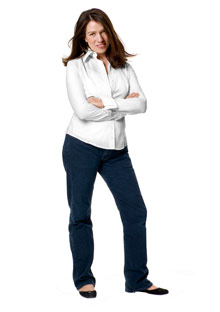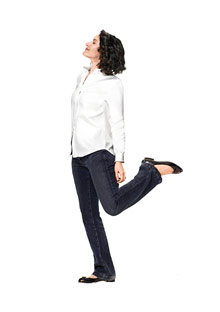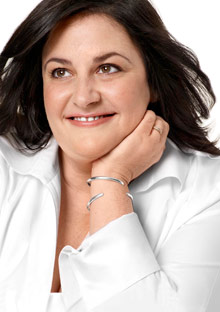
Photo: Mark Andrew
Three O staffers come forward with their own stories, starting with Celia Barbour.
I knew how I was supposed to look, and that I didn't measure up. My sources were, on the one hand, Charlie's Angels and, on the other, the hallway mirror, which testified to the inadequacy of my 13-year-old body."I'm so fat and ugly no one's ever going to like me," I moaned to my mother.
She was not alarmed. She said, almost scoldingly, "You look fine. You are not fat. Sit up straight and finish your breakfast.
Clearly, she was blind. I embarked on a jogging regimen, awakening in the darkness to put on my Adidas, slipping out of the house. When I returned, my father barely looked up from his oatmeal. "If you want exercise, there's plenty of lawn to be mowed," he said.
My parents' obtuseness antagonized me. Instead of helping me overcome my freakishness, they pretended not to see it. To them, exercise was frivolous; dieting was frivolous. The whole pursuit of beauty—makeup, blow-dryers, my beloved Mademoiselle magazine that explained step-by-step how to create a smoldering eye—was a huge, scandalous waste of energy. I longed with the deep hunger of the malnourished to experience prettiness in all its artificially enhanced forms. But I couldn't even walk through the kitchen with blush on my cheeks without drawing their quiet censure.
In those days, my father was a professor at a liberal arts college. His colleagues had shaggy hair and dressed in smocks made by Guatemalan peasants, or bore epaulets of dandruff on the shoulders of their thrift store suits. The only people who dolled up their faces and feathered their hair were the townies, and they were not worth emulating. The prevailing attitude on campus was clear: You worried about your appearance only if you had nothing better to contribute to the world. If you were talented, brilliant, funny, or wise, you were free to ignore superficial things, like beauty.
Eventually I emerged into a kind of quiet prettiness. It suited me fine. I was never drop-dead stunning, but I went out with the boys I had crushes on. It was a happy way to spend my late teens and 20s.
Now I am 44 and once again do not love the mirror. In it I see a body stretched and battered by the birth of three children, a face turning wrinkled and gray. And I think, "Yuck." But I also think, "Well, okay, I'm 44. Prettiness was mine when it should have been mine. Now I have other things to attend to."
Sometimes I still wish I were a little more skilled with the eyeliner, but I don't despair. I've realized that my parents' seeming cluelessness was actually great wisdom; they valued my accomplishments more than my looks. And this freed me up to discover a really important secret: The things that make me feel like a superhero—making love, swimming across a lake, staying up all night to write, giving birth to a baby who holds infinity in his eyes—make me look like tangled, puffy hell. But the mirror can't take away what I know in my heart to be true: At times like these, I'm drop-dead gorgeous.

Photo: Mark Andrew
Her model-mother meant well, but Suzan Colón never forgot that offer.
Having a mother who was a model had predictable perks and drawbacks. As a child I was the envy of all the other kids when Mom came to pick me up at school; she looked like one of their Barbie dolls come to life. But a few years later, she could send my teenage inferiority complex into overdrive just by existing in all her blonde goddesslike perfection.At that point, it seemed as if I'd inherited all the wrong genes. I had her height but not her bust size, her myopia but not her beauty; I was this tall, flat-chested kid with features way out of proportion to my face. My huge eyes were positively buggy behind my thick glasses; my already full lips were pushed out by my buckteeth. And then there was my nose—too long, too wide, and, well, too much.
Mom told me all the time that I was beautiful, but she was supposed to say that. Besides, what did she know? Her nose fit her face perfectly. As a teenager, it had been her only imperfect feature, but she'd gotten it "fixed," as people used to call it. So Mom didn't see a problem with interrupting one of my agonized rants about my looks: "Well...you could always get a nose job. It wouldn't be major surgery—just this." She gently pinched the sides of my nose, near the end where it tapered out, and tilted it upward.
My mother's offer of a nose job seemed confirmation that I needed one. But I was a rebellious kid, and my answer to every parental suggestion was "No!" The idea that there was something unattractive about my nose made me protective of it. I identified with it, sympathized with it—it was me and my nose against the world!
My feelings about that conversation changed as I got older. I understood my mother didn't really think there was anything wrong with how I looked. She was just offering to help me get past the awkward stage (or just trying to shut me up; I was an expert whiner back then). As my features settled and found harmony, I came to appreciate my strong nose, which balances everything else on my face.
Occasionally I pinch and tilt it the way Mom did that night, imagining what it would be like now if I'd gotten it fixed. I'd look like a weasel. It makes Mom and me laugh, which only makes us prettier.

Photo: Mark Andrew
J.J. Miller recalls her mother's (self-fulfilling?) prophecy.
I can visualize my 11-year-old self, a four-foot-tall brunette, in a sky blue leotard and heavy makeup, center stage for our final performance at Bay Country Camp of the Theater Arts in Maryland. It was a moment of glory, I felt sophisticated and grown-up, and frankly, as beautiful as Miss America on her best day. So I was shocked when, back home in Virginia, going through the photos with Mom, she said, "We need to talk. Look, J.J., at the way you're standing onstage. Your tummy is sticking out, and your back isn't straight. Honey, you come from a family of short women, and this will be something you'll have to struggle with the rest of your life, so you need to learn how important it is to stand up straight and hold your stomach in now. Weight will always be an issue for you."I was mortified. (Do all my camp friends think I'm fat ?) I was devastated. (Fat people can't become famous actresses!) And I was confused. (Did she just say forever ?)
Today I wonder if, in that moment, a self-fulfilling prophecy was uttered that changed my life irreversibly and hardwired in my psyche my own personal cross to bear. It seems impossible, but I sometimes think, "Could I have been a thin girl?" Because I have to admit I remember the palpable, almost physical shift that happened in my brain that day, and I can't help but think that day is when my lifelong struggle with my family, my mother, and, mostly, my own body began.
"You're the fattest ballerina" and other shocking comments from mom and dad...




